You’re Here Because You Believe You are Worth a Little More, or a Lot More, and are Considering a Salary Negotiation.
Good on you. Most people just wait for the pay rises. You believe you are worth more and you probably are right. Or, you are here because you have received a job offer and wouldn’t mind a little more. I can help with these salary negotiation tips.
Just before we get stuck in, let’s take a look at 3 facts according to our friends at salary.com:
- 41% of people did not negotiate a salary for their current position.
- Why not? The worst that could happen is that their employer said no. Ask. You have nothing to lose.
- 59% of people that did not want to ask for a pay rise said that they feared rejection.
- Rejection is hard, but gaining a pay increase is better. Keep in mind how your partner will look when you tell them that you got a pay rise. Treat them because that will keep you motivated.
- 73% of employers were not offended by requests for pay rises.
- They’re a business and they expect some people to ask. You can either be one of them that asks or not.
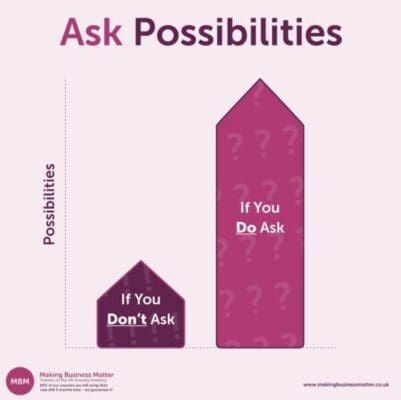
Take a look at these 10 salary negotiation tips whether you are employed or if you are thinking about negotiating a salary offer. These salary negotiation techniques will help you with both to get what you deserve.
Begin with the End in Mind
Stephen Covey wrote ‘The 7 Habits of Highly Effective People‘. A world-renowned book published in 1989 and has sold over 15 million copies. In Habit #2 Stephen advises us to ‘Begin with the End in Mind’. He shares with us that everything is created twice. Once in our minds and secondly in reality. Yet, how many times have you just tried, had a go, or thought let’s see what happens and failed because you did not do what you really wanted?
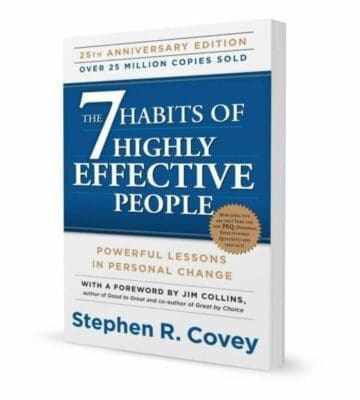
What do you want?
Yes, a simple question. Tough to answer. You want more, but 1% more – is that enough? No, so how much is enough? Knowing the answer to this question is critical because without it, you are throwing darts at a dartboard and whatever number you hit is the answer, because you didn’t know what you wanted, so why not the number you hit?
I suggest using a simple technique we call ‘P.R.O.’; Pessimistic, Realistic and Optimistic. Thinking about your salary increase write a number against each of those 3. For example, if you are earning £50,000 and you want to have a salary negotiation, your preparation would start with some thinking about those 3 numbers:
- Pessimistic: +5% gives you £52,500 – an increase of +£2,500.
- Realistic: +10% gives you £55,000 – an increase of +£5,000.
- Optimistic: +15% give you £57,500 – an increase of £7,500.
Obviously, the last one looks the best one, but taking into account factors like; you had a raise 6 months ago, the company is struggling, there are redundancies, etc. you need to decide that the realistic number is your end in mind. Great – you now have a target.
Not Everything is About Money When You Do a Salary Negotiation
Is it not? No, it’s not. Herzberg’s theory of motivation said that there are two factors:
- Motivating Factors – The presence of motivators causes employees to work harder. They are found within the actual job itself.
- Hygiene Factors – The absence of hygiene factors will cause employees to work less hard.
In essence, once we earn what we think we are worth (hygiene), then we look to know that we are adding value (motivating). You might not get a pay rise but the promise of promotion next year, to be part of the fast-track programme, to look after a prestigious client, etc. There isn’t just one path to happiness and satisfaction. Yes, money is a very recognisable and measurable one, but something like being fast-tracked could be worth more in the future.
Once you have accepted that the salary negotiation might not be a straight discussion about money and that other things bring value, and sometimes, greater value, you are ready for the ‘squaredance’. This negotiation template will help you to prepare, and with preparation comes confidence. By preparing for alternative scenarios to the unlikely scenario of ‘Can I have a big pay rise?’ – ‘Yes’, you open your mind to a promising negotiation. Use this negotiation preparation technique to build your confidence.
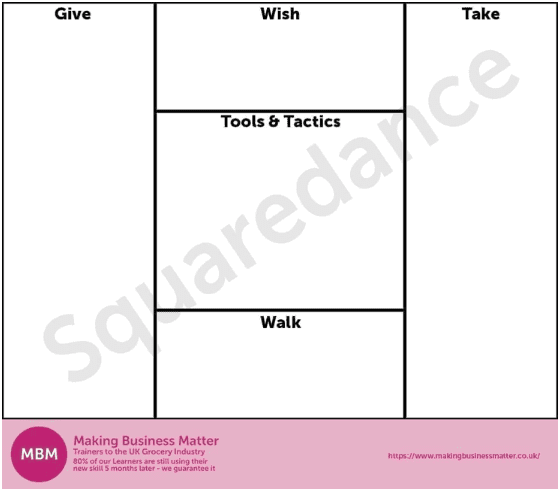
Know What You are Worth – Part 1
Your job title, or the job title you are applying for, has a salary range – Find out what it is. There is no shortage of companies offering advice on salary ranges. Normally recruitments sites. Use their calculators, salary range advice, and know what salary other companies are offering for a similar role.
In essence, you don’t want to enter into a salary negotiation without knowing what the job is worth. You wouldn’t consider buying a second-hand car without having looked through Auto-trader and alike to know what the car is worth. This is the same. Only, it is more important!
You’ll discover a range because one job will have variables, for example, location in London, which will command a higher salary, whereas another job will be in Scotland, which will command a lower salary. The variables will be infinite, but essentially, the size of the company, location, and the additional benefits, will be the biggest variables.
Once you have your salary range from what others are prepared to pay for the role and the advice from the recruitment guys, you have done your salary homework. Now onto the next piece of homework…
Know What You are Worth – Part 2
As Plutarch Heavensbee, the Gamesmaker, said in the film ‘Hunger Games: Catching Fire’, ‘…it just needs a little salesmanship’. You have your salary range, and now you need to prove that you are at the top end of that range.
Type into Google ‘training provider’, and find the top 4 companies. Open each training provider on a separate tab. Cover up the logo and go to each tab. They all same the same thing; passionate, great trainers, fabulous testimonials, etc. etc. It’s the same with people. Imagine that 3 people are applying for the same job as you or that 3 people are lined-up to take over your job, they will all say that they are good with people, can build rapport, are hard-working, etc. The key question is ‘What can you say that they can’t?’.
- ‘My closing rate is +5ppts above anyone on my team.’
- ‘I won an award for being a top 30 influencer in my field.’
- ‘My biggest client doubled their spend in 2 years’.
We all work hard, we’re all passionate, blah, blah, but what makes us stand out from the crowd? That is where you earn the top end of the salary range. That is where you deserve the bigger bucks. If you haven’t got such a statement, get one. Work hard, yes, but don’t get lost in doing your emails and instead focus on making a big difference. The kind of difference that turns heads. A difference that makes people stop and think, yes, you are worth it.
Know What You are Worth – Part 3
Call recruiters and ask what you are worth. It’s just like phoning an estate agent and asking them to value your house. I suggest asking 3 different ones. They may even have some advice on how to achieve a win:win when negotiating your job offer. Plus, they’ll have you in mind for your next move in 18 months.
‘I can pay you £4,225 for your VW Polo 2013 Reg’
Specific numbers seem calculated. More thought through. They don’t have to be, but they seem so. Notice I didn’t say, ‘I can pay you £4,227.38 for your VW Polo 2013 Reg’. This was because if we are too specific then it looks ludicrous but we need to be more specific than ‘I can pay you £4,500 for your VW Polo 2013 Reg’. There’s an art to getting it right in the middle. Enough to look a though it was well thought through without being too much to sound silly.

By asking for a specific number, they will think that you have really done your homework and that the number is very credible and that they had better take note. You might say, ‘I believe the appropriate salary for this role is worth £57,625 because I have reviewed 7 salary range websites, spoken to 3 recruiters, and seen 9 similar job offers’.
Notice I Used ‘Because’ and Aristotle’s Power of 3 And I Pushed
Read again the statement ‘I believe the appropriate salary for this role is worth £57,625 because I have reviewed 7 salary range websites, spoken to 3 recruiters, and seen 9 similar job offers’. This was a carefully constructed sentence because it used three key principles of persuasion:
Because
A study by Ellen Langer of Harvard in 1978 studied the power of because. Using one simple word. The study was about queuing at a photocopy machine. This was the 70’s! In essence, a person was asked to interrupt the queue and ask one of the following questions:
- “Excuse me, I have 5 pages. May I use the xerox machine?”.
- “Excuse me, I have 5 pages. May I use the xerox machine, because I have to make copies?”.
- “Excuse me, I have 5 pages. May I use the xerox machine, because I’m in a rush?”.
The wording affected the results:
- “Excuse me, I have 5 pages. May I use the xerox machine?”: 60% compliance.
- “Excuse me, I have 5 pages. May I use the xerox machine, because I have to make copies?”: 93% compliance.
- “Excuse me, I have 5 pages. May I use the xerox machine, because I’m in a rush?”: 94% compliance.
Using the word ‘because’ and then giving a reason resulted in significantly more compliance. This was true even when the reason was not very compelling (“because I have to make copies”). The researchers hypothesised that people go on “automatic” behaviour and that hearing the word “because” followed by a reason (no matter how bad), would cause them to comply.
Use the word because to make a stronger pitch.
Aristotle’s Power of 3
Aristotle was a Greek philosopher and identified that people liked hearing 3 things. Steve Jobs was an expert at doing this and in his public presentations managed to share the 3. For example, at the iPad 2 launch, Steve said, ‘Thinner, lighter, faster’. We seem to be predisposed to accepting 3 reasons. It appeals to us. Multiple-choice questionnaires tend to be 3 options. More options and we tend to move into choice paralysis and less, & we feel short-changed.
In the pitch we made 3 supporting reasons;
- 7 salary range websites.
- spoken to 3 recruiters.
- seen 9 similar job offers.
Make a solid pitch by including 3 supporting reasons.
Push Influencing
The push and pull model of influencing is life-changing for those that want to become better influencers. In short, a push influencer shares their thoughts, and a pull influence seeks the thoughts of the other person. Most of us are dominant in one or the other. One is not better than the other. The challenge is to use the best one for the situation. In this case, we are looking to push, or share, our thinking with others. We have a thought and we want to share it. In this example, the thought is:
“I believe the appropriate salary for this role is worth £57,625 because I have reviewed 7 salary range websites, spoken to 3 recruiters, and seen 9 similar job offers.”
We are influencing through push. The piece after sharing is to then pull…
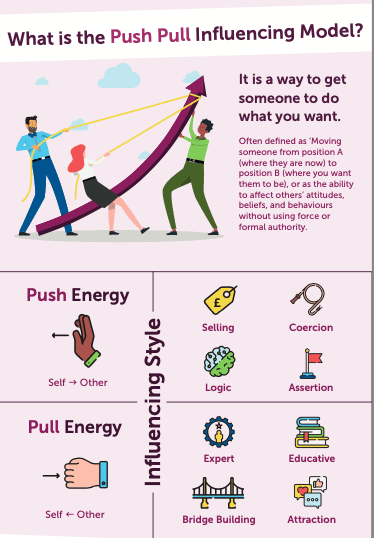
Silence is Golden
After making your pitch it is time to switch from push to pull influencing. From, here is my thinking, to now listening and maybe asking questions. Understanding their reaction, their thoughts and not doing what so many people do when they want to communicate their point – repetition, repetition, and more repetition. Repetition does not make the point better, it just aggravates the person.
It’s Like Playing Chess
Your pitch to discuss your salary might not be one move because they might say, ‘Let me have a think’ and come back to you. Then you have another meeting, or they don’t reply & your waiting or they blame their boss – ‘It’s with Mike to take a look at’. It is very unlikely that your boss has the power to authorise a salary increase in that conversation, so you need to manage your own expectations of what is achievable in that conversation and manage the whole process. Like, what are you going to do if you are waiting 4 weeks, or he doesn’t come back?
This is where you need to not only make a pitch but also ask enough questions so that you are sure of the next steps. Yes, you might get brushed off because you have caught them on the hop, but at the very least you need to gain their permission with something like, ‘If I don’t hear from you in a couple of weeks, may I bring up this topic again?’. They are likely to say yes and now you have permission to go back.
Wonder Woman
Watch Amy Cuddy share a fabulously quick and simple trick for building your confidence – 63 million views cannot be wrong!
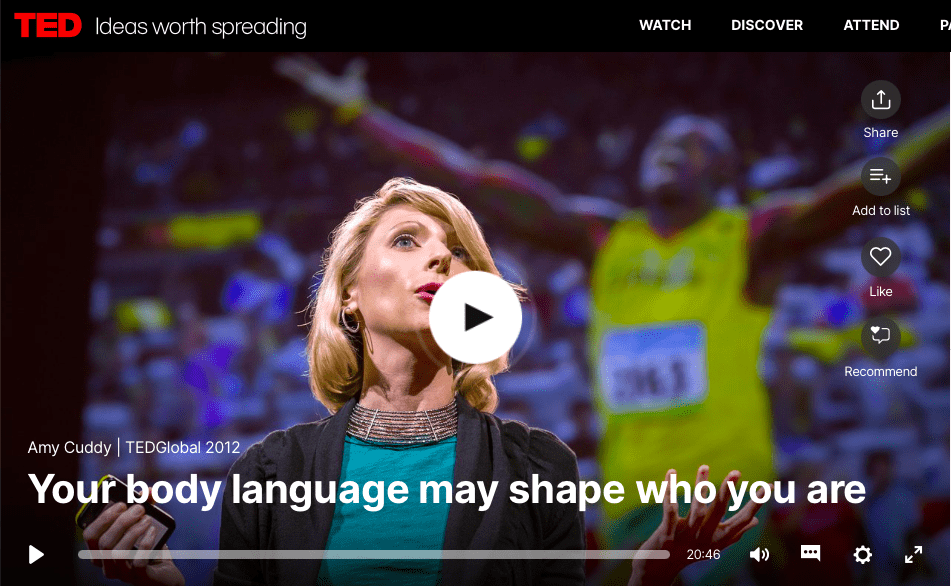
Confidently Ask
My daughter sold her second-hand car recently. The guy sees it online, we book a time and he arrives. The usual kicking of the tyres, talking about servicing takes place, which is really a prelude to the question he really wants to ask of ‘Will you take £500 off the price, mate?’. The problem wasn’t the question, the problem was how he asked. A tone of failing, hesitancy, and desperation. I knew from his tone that he did not expect to get £500 off and probably would have been happy with £100. All that in a tone? Yes, we all seek congruency between the words, the tone and the body language. There was no congruency. The fact he also had his arms crossed didn’t help much either.
The morale? If you are going to ask, ask. Ask confidently, expectantly, and like you know it’s possible because anything else just sounds like a hail Mary, and they know it too.
Word on Head
Read this influencing technique because it will increase your chances.
What’s In It for Me?
The most listened to radio station in the world – ‘WII4ME’. This is a salary negotiation, so be prepared that you might need to negotiate. When you make your pitch they are probably thinking, ‘what’s in it for me?’. More productivity? More sales? Happer clients? What do they get? If it’s just more of the same, it doesn’t feel very persuasive, although you might be lucky. Only you can decide that. Maybe there is more. Could you promise more and achieve more? If the answer is yes, then it is a good piece to keep in your back pocket for the negotiation.
Or maybe you use the most used and most effective negotiation technique of all, ‘If you…then I…’. If you increase my salary to £57,500, then I will increase sales by +£100k by the end of the year’.
Companies want to make more money and if you can make them more money, they’ll at least consider your offer.

Salary Negotiation Email
My advice is don’t. Yes, it is hard to do the negotiation face-to-face, and firing off an email is easy. Easy to be tougher on email, but remember that it is also easier for them too. Easier for them to say ‘No’. It’s harder to say no to someone’s face. Pluck up the courage, use the tools above and make your confident pitch to earn what you deserve face-to-face.
Good luck with your salary negotiation. As the book says, ‘Feel the fear and do it anyway!’
Action: For even more useful content on negotiations, check out our ultimate guide on negotiation skills.




